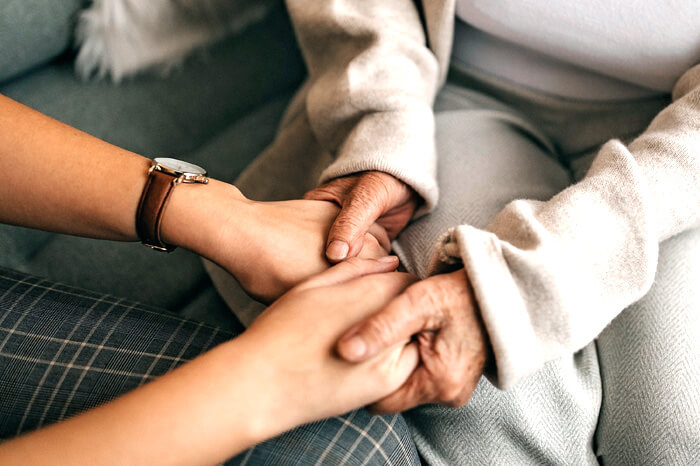As the U.S. population continues to age, so does the need for caregivers. Currently, more than 53 million Americans are providing unpaid care for family members and loved ones. With the number of people aged 65 and over rapidly increasing, more people will find themselves in the role of caregiver.
Caregiving is a demanding job, especially when it’s usually one person tending to a person in need, whether a child, an adult, or an older adult. This can lead to feelings of isolation, financial strain, and more – all of which can result in caregiver burnout.
If you’re caring for someone on a daily basis, it’s important to take care of yourself. The following tips for self-care for caregivers are a reminder that you should make sure that you are not ignoring your own needs. When you take care of yourself, you can take better care of your loved ones – focusing on the rewards of caregiving.
Effects of Caregiving on Health and Well-Being
Caring for a family member can be a rewarding experience, but the demands of continuous care can be overwhelming at times and cause stress or other health problems. Older caregivers aged 66 and above face a significantly higher risk of dying than non-caregivers. Younger caregivers who work full-time while raising young children have increased risk of depression, chronic illness, and a lower quality of life.
Even so, caregivers of all ages tend to put aside their own needs and forego the practice of self-care. As a result, they don’t eat properly. They don’t make time to exercise, or they often postpone making medical appointments. Caregivers also face greater risk of excessive alcohol and drug consumption, and are more likely to experience high cholesterol, high blood pressure, and weight problems. All of which takes a physical and mental toll.
Care For Yourself First
To maintain the health, energy, and emotional stability to provide ongoing care for someone, caregiver self-care needs to be a priority. However, unrealistic attitudes and beliefs about your caregiving responsibilities can get in the way of practicing self-care.
Putting yourself first may seem selfish. You may think your responsibilities for the care receiver are more important than your own health. You may feel guilty about devoting time to yourself. To overcome these and other obstacles to caregiver self-care, identify your mental barriers and change the behaviors they create.
Here are some realistic tips to help you understand the importance of self-care and how to go about it:
Reduce your stress level.
Managing stress starts with recognizing the early warning signs, such as irritability, sleep problems, and forgetfulness. Identify the leading causes of stress for you, such as family disagreements, lack of resources, job pressures, etc., and determine what you can and can’t change. Keep in mind that you can only change yourself. Trying to change people and situations you have no control over will only increase your stress.
Check out these simple breathing techniques to help reduce stress.
Take action.
Identify activities that help you reduce stress, such as gardening, meditation, spending time with a close friend, walking or other forms of exercise. Establish a schedule for these activities, and stick to it.
Read how exercise positively impacts mental health.
Set goals.
Write down a list of ways you want to treat yourself or find time for yourself for the next three to six months. These can include enlisting help in preparing meals or other caregiving tasks, getting involved in an activity you enjoy – anything that will give you time to yourself. Identify the steps needed to achieve each goal and create an action plan.
Seek help.
When you prioritize the importance of self-care, you also acknowledge you need help. Ask family members or friends to assist on occasion. Try linking the request to their talents or interests. For example, if a friend likes to cook, ask them to help with meals. If someone in your social circles enjoys volunteering, ask them to take a turn going to the grocery store and taking the person you care for with them. If you don’t want to miss medical appointments, think of other tasks for which friends and family can assume responsibility.
If you’re uncomfortable asking for help, take a moment to make a list of your caregiving duties – recurring and occasional — and when a friend or family member reaches out, let them choose from the list.
If you’re feeling isolated from friends, let them know you’d love them to visit you even when you’re taking care of your loved ones.
Talk to your family physician.
Medical professionals are your best resource for dealing with stress. Make a list of issues you want to discuss with your doctor, such as the stress you feel, your overall health, fears about not being up to the task, and any other caregiving concerns you may have. If the stress of caregiving is wearing you down, let your provider know.
TrueCare Primary Care providers offer compassionate, sensitive care for generations of families in San Diego and Riverside Counties.
Realistic Caregiver Self-Care Ideas:
These simple tips can help you manage the day-in and day-out stresses of caregiving.
Health and wellness.
- Pay attention to changes in your mood. Have you lost interest in favorite activities? Are you having trouble accomplishing every-day tasks? If so, contact your doctor.
- Watch for signs of stress. Impatience, difficulty sleeping, loss of appetite, lapses of concentration or memory – these are all signals of unhealthy stress.
- Eat a well-balanced diet. Drink plenty of water. Exercise by taking short walks (20 minutes) at least three times a week.
Relaxation.
- Set aside a couple hours each week for activities you find enjoyable. Or simply allow yourself to have downtime.
- Listen to relaxing music or guided relaxation recordings. The Internet is a wonderful source for both.
- Don’t let yourself get too tired. Schedule short rest periods between activities. Practice good sleep habits.
- Avoid overloading your daily schedule. Set limits for what you can do.
Me Time.
- Don’t try to carry the whole load on your shoulders. Let family members and friends help with household chores, meal preparation, childcare, and shopping.
- Maintain open communication with the care receiver, family and friends, and your health care team.
- Join a caregiver support group. Sharing your feelings with others facing the same challenges can reduce your sense of isolation and inability to do the job.
- Give yourself credit. The care you give someone makes a big difference in their lives!
Take Charge of Your Own Care
As a caregiver it’s not selfish to focus on your own needs too. No one is going to do it for you – you must prioritize your own well-being. Get rid of any mental barriers to taking care of yourself. Identify your stressors and try different ways to overcome them – even if just for 20-30 minutes a day! Get proper rest and nutrition. Exercise regularly. Schedule time off without feeling guilty. Ask for and accept help from friends and family members and communicate regularly with your physician. When you practice caregiver self-care on a regular basis, you’ll feel more rested and capable of giving the care your loved one needs.





